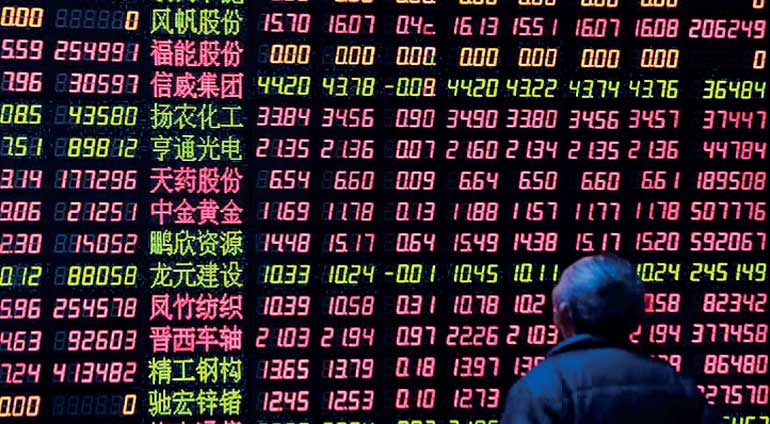Friday Jan 16, 2026
Friday Jan 16, 2026
Tuesday, 30 August 2016 00:01 - - {{hitsCtrl.values.hits}}
Reuters: Most Asian share markets tumbled on Monday while the U.S. dollar added to gains made after Federal Reserve Chair Janet Yellen indicated a U.S. interest rate increase remains on the cards for this year.
European markets also looked set for a weak start, with financial spreadbetters expecting Germany’s DAX to open down 0.7%, and the blue-chip Euro Stoxx 50to begin the day 0.6% lower. British markets are closed for a holiday.
MSCI’s broadest index of Asia-Pacific shares outside Japan extended losses to 1%.
Japan’s Nikkei bucked the trend, closing 2.3% higher, the biggest one-day gain in three weeks, as the yen weakened against the resurgent dollar.
China’s CSI 300 index and the Shanghai Composite slipped 0.2%. Hong Kong’s Hang Seng shed 0.4%.
The case for a U.S. rate hike has strengthened in recent months, with a lot of new jobs being created, and economic growth looks likely to continue at a moderate pace, Yellen said in a speech at the Fed’s annual monetary policy conference in Jackson Hole, Wyoming, on Friday.
While Yellen did not give guidance on what the central bank needs to see before raising rates, she said the Fed already thinks it is close to meeting its goals of maximum employment and stable prices. She described consumer spending as “solid” but noted that U.S. business investment was weak and exports hurt by a strong dollar.
Comments by the Fed’s No. 2 policymaker, Vice Chair Stanley Fischer, following Yellen’s speech also bolstered the case for a hike this year.

Asked on CNBC whether a rate hike in September and more than one policy tightening before year-end should be expected, Fischer said Yellen’s comments were “consistent with answering yes” to both questions, albeit still data-dependent.
Among the first data to be scrutinised will be U.S. consumer confidence for August, due on Tuesday; productivity, manufacturing and construction figures on Thursday; and August non-farm payrolls data rounding out the week on Friday.
Global factory activity surveys will also be released on Thursday.
Traders have modestly raised expectations for U.S. rate increases this year, but remain cautious.
The odds of a hike in September rose to 33% following the comments, from 21% on Thursday, according to CME Group’s FedWatch tool. Traders were pricing in a 59.1% chance of a hike in December, up from 51.8% on Thursday.
“While the move towards another Fed rate hike will likely cause bouts of consternation in investment markets I don’t see the same degree of uncertainty that we saw around last year’s Fed rate hike,” Shane Oliver, head of investment strategy at AMP Capital in Sydney, wrote in a note.
“It’s clear from the Fed’s actions this year that it is aware of global risks, the impact of its own actions on those risks and any potential blow back to the U.S. economy and of the impact of a rising U.S. dollar in doing some of its work for it.”
The comments from Yellen and Fischer dragged Wall Street lower at the close.
But they proved a boon for the U.S. currency, with the dollar index, which tracks the greenback against six global peers, jumping 0.8% on Friday. It held steady at 95.552 on Monday.
The dollar rose 0.5% to a two-week high of 102.34 yen on Monday. That followed gains of 1.3% on Friday, its biggest one-day advance in almost seven weeks.
Japanese household spending and retail sales data for July are due on Tuesday. Investors are seeking some sign that Prime Minister Shinzo Abe’s massive stimulus programmes are having an effect, after figures on Friday showed a decline in consumer prices by the most in three years in July.
The euro was flat at $1.120 after tumbling 0.8% on Friday, its biggest one-day slide since July 15.
In commodities, crude prices retreated on the rally in the dollar and concerns about growing output after exports from Iraq in August exceeded July levels.
Iran also said late last week that it would only cooperate in upcoming producer talks in September if other exporters recognised Tehran’s right to regain market share lost during international sanctions that were only lifted in January.
U.S. crude futures dropped 1.5% to $46.95.
Global benchmark Brent crude retreated 1.2% to $49.31.
The stronger dollar also weighed on gold. Spot gold slipped 0.2% to $1,318.10, after earlier touching a five-week low.